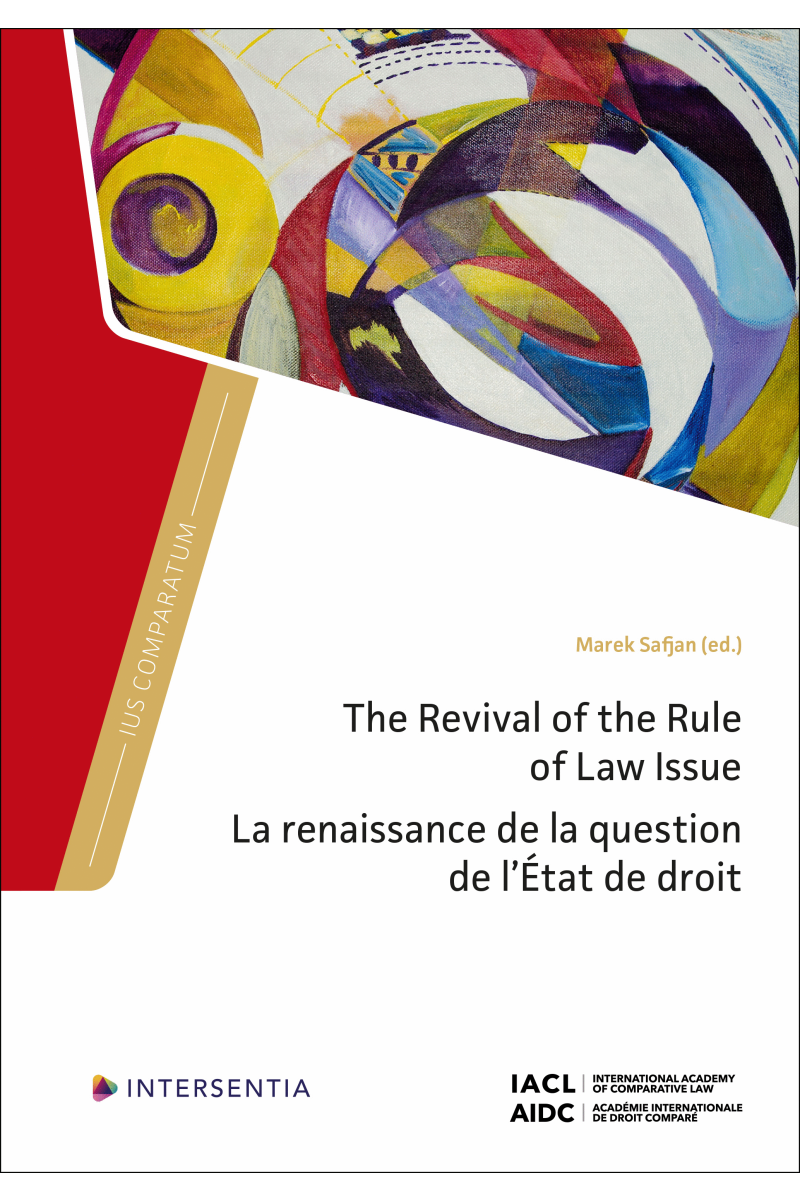 maestro
mastercard
visa
maestro
mastercard
visa

The Revival of the Rule of Law Issue

The Revival of the Rule of Law Issue brings to light the diversity of approaches to the rule of law in contemporary legal systems on one hand; on the other, it addresses those components that can be recognised as constituting the essence of the concept of ‘rule of law’. A comparative analysis diagnoses the most pressing threats and deficits that pose a risk to the proper, effective functioning of a system based on the rule of law, and makes predictions concerning the direction of further development of the principle of rule of law. Broadly speaking, this volume asks whether, in today’s world, one can justifiably formulate a thesis about the revival of this principle and, if so, in what sense.
The first and fundamental conclusion of the principle of the rule of law cannot, in accordance with the dominant approach in the contemporary world, be reduced to purely formal adherence to the provisions of positive law. Further significant requirements must also be met, including respect for fundamental rights; the mechanism of the separation of powers (checks and balances); and democratic mechanisms of exercising power. Against the background of the reports, one important conclusion of this volume is the recognition that, in every democratic rule-of-law system, a mechanism for real, effective control that limits the discretion of any one branch of government should exist. Contemporary legal systems in fundamentally democratic countries are not free from significant flaws, weaknesses or deficits in rule of law guarantees. The most concerning phenomenon is the so-called systemic or structural crisis of the rule of law, which is characterised by the simultaneous occurrence of a whole set of factors blocking the effective, proper functioning of the mechanisms of a legal state, and which primarily threatens the independence of the judiciary.
To maintain the principle of the rule of law, formal—even strong—normative guarantees expressed in such high-rank acts as a constitution, referring to democratic mechanisms, fundamental rights and institutional solutions, may prove insufficient under certain conditions if not accompanied by good and established constitutional practice, as well as sufficiently developed constitutional and civic awareness, and effective mechanisms for ensuring legal compliance.
This volume comprises 25 reports, encompassing not only national systems (from European and non-European countries), but also analyses from the perspective of such international organisations as the European Union, the Organization for Security and Co-operation in Europe and the Council of Europe (Venice Commission).
Prof. Marek Safjan was the Polish judge at the Court of Justice of the European Union from 2009 to 2024. He is Professor emeritus of the University of Warsaw and was the Vice-Rector of the University from 1994 to 1997. Through numerous publications, he has been an active contributor to legal research in the fields of civil law, medical law, and European law. He was appointed as a judge of the Polish Constitutional Tribunal in 1997 and became President of the Tribunal in 1998. He continued in that role until 2006.
Digital version available on :
- Strada lex Belgium
- Strada lex Luxemburg
- Strada lex Europa
You have a subscription? Activate the digital version for free with the code in the book.
| Type of product | Book |
|---|---|
| Format | Hardback |
| EAN / ISSN | 9781839705458 / 9781839705465 |
| Series name | Ius Comparatum |
| Weight | 1241 g |
| Status | Available |
| Number of pages | 632 p. |
| Access to exercice | No |
| Publisher | Intersentia |
| Language | English |
| Publication Date | Oct 29, 2024 |
| Available on Strada Belgique | Yes |
| Available on Strada Europe | Yes |
| Available on Strada Luxembourg | Yes |
Downloads
- Table of contents and preliminary pages
- General Report: The Revival of the Rule of Law Issue
Marek Safjan, Lukas Swyton - PART I. SPECIAL NATIONAL REPORTS
- Afghanistan
Amal Sethi - Argentina
Alberto R. Dalla Via - Australia
Lisa Burton Crawford, Dan Meagher - Brazil
Emilio Peluso Neder Meyer - Canada
Han-Ru Zhou, Audrey Labrecque - China
Sarah Biddulph - Egypt
Mohamed ‘Arafa - France
Carolina Cerda-Guzman, Pauline Gervier, Sébastien Platon - Germany
Helmut Philipp Aust - Hong Kong
Johannes Chan - Indonesia
Abdurrachman Satrio - Italy
Luigi Melica - Lithuania
Egidijus Kūris - Poland
Marek Zirk-Sadowski, Marta Sarnowiec-Cislak - Romania
Raluca Bercea, Radu Rizoiu - South Africa
Jamil Ddamulira Mujuzi - Suisse
Luc Gonin - Turkey
Cansu Muratoğlu - United Kingdom
Alison L. Young - United States
Mortimer Newlin Stead Sellers - PART II. SPECIAL INSTITUTIONAL REPORTS
- The Rule of Law as an EU Institutional Issue
Dominik Düsterhaus - Supremacy Rule of Law Undermines the European Union
Dimitry V. Kochenov - Transversal Report on Systemic Threats to and Violations of the Rule of Law in the European Union
Laurent Pech - The Organization for Security and Co-operation in Europe: The Revival of Rule of Law?
Marta Achler - Rule-of-Law Soft Law of the Venice Commission
Kaarlo Tuori - Appendix: Questionnaire
- Index
- About the editor
- About the series
- Advert Strada lex Europe